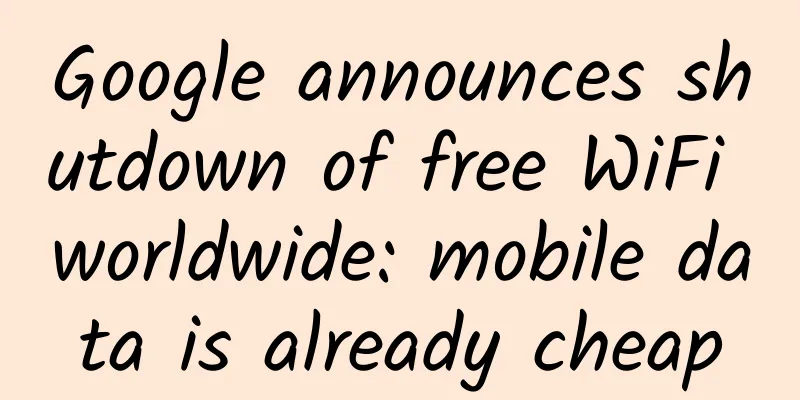Google announces shutdown of free WiFi worldwide: mobile data is already cheap

|
As the world's largest web search and online advertising company, Google has been promoting a business segment over the past decade - that is, increasing the number of Internet users and Internet penetration around the world through various means. One of its products is free Wi-Fi Internet access services in many countries. However, surprisingly, on February 17, Google announced that it would gradually shut down its free Wi-Fi Internet access services in 2020. According to foreign media reports, as part of the plan, Google has cooperated with multiple partners to launch free Wi-Fi Internet access in many countries around the world, including India, Nigeria, Thailand, the Philippines, Mexico, Indonesia, Brazil and South Africa. India, the hometown of Google CEO Pichai, is a key market for Google's free Wi-Fi Internet access. Google once launched Internet access services in more than 400 railway stations in India. Caesar Sengupta, Google’s vice president for payments and the Next Billion, its effort to boost internet penetration, said Google’s free Internet program, launched in 2015, helped millions of users go online — many for the first time — without worrying about how much data they consumed. But he said the service was no longer necessary as mobile data became more affordable in many markets, including India. In addition, Google said it was difficult to find a sustainable business model to expand the program. In recent years, Google has explored ways to monetize Google Wi-Fi. For example, the company began showing an ad when a user logged in to connect to its Internet service. In an interview earlier last year, Gulzar Azad, who leads Google's free Wi-Fi efforts in India, told the media that the company is considering how to expand free Wi-Fi to more markets, but noted that Google has already reached its goal of providing free Internet services in 400 railway stations in India. A year after Google announced it would offer free wireless in India, India's richest man, Kesh Ambani, launched his own mobile communications company, Jio, which is part of Ambani's Reliance Industries conglomerate. Jio has revolutionized the Indian telecom market by drastically reducing the price of mobile data services and even providing free mobile Internet services to consumers for a long time. Jio has gained countless users and forced other mobile operators in India to reduce data prices, making mobile Internet affordable for many ordinary Indians, and India's mobile Internet market has begun to flourish. Jio is also unique in that it has launched cheap feature phones that support 4G network access, allowing Indians to become mobile Internet users without having to buy more expensive Android smartphones. In another interview, the media asked the executive Azad whether the influence of Google's free Internet access had been reduced because of Jio. At that time, he said that many people were still signing up for the company's free Internet service and the amount of data consumed had not decreased. In many countries, Google has partnered with companies to provide free Wi-Fi to the general public in public places. In India, Google is responsible for the relevant software development, while RailTel, an Indian state-owned telecommunications infrastructure company, is responsible for the relevant network services. RailTel, which provides wireless networks at more than 5,600 railway stations in India, has developed its own proprietary software over the years. "We are working with our partners to transition existing free Wi-Fi services so that they can continue to be a useful resource for the communities they serve," said Google executive Sengupta. Google will phase out free Wi-Fi access worldwide this year, except in India. Sengupta said that in India, the price per GB of mobile data is the cheapest in the world. He cited a report that in the past five years, the price of mobile data in India has dropped by 95%, and the average Indian smartphone user consumes nearly 10GB of data per month. "Similar to what the Indian government has done, some governments and local entities have launched their own plans to provide everyone with more convenient and economical Internet access." It is well known that in developing countries, mobile Internet speeds are generally not high. Therefore, in conjunction with the "Next Billion Users" plan, Google has launched a series of lightweight software, such as YouTube Go and Google Go. These software have lower requirements for Internet speed or smartphone memory. Google has also launched an offline function for application software, which can download as much data as possible when there is Internet access and can be used when there is no network. "Our commitment to supporting the next billion users is stronger than ever, and we will continue to work hard to make the internet work for more people," said Sengupta. As we all know, Google is the world's largest web search service provider, and search advertising is its most important source of income. These Google products are already showing signs of aging, but if more users can be developed in developing countries, it will be able to increase the traffic of Google products and the number of online ad clicks, thereby boosting Google's revenue. This is an important reason why Google is promoting its Internet access business. Past contraction In the past, there were many teams within Google developing various technologies to increase Internet penetration, but many projects have been canceled or shelved. For example, Google once planned to fly giant drones in the sky to provide network access to people in remote areas on the ground. The solar-powered drones would become giant mobile Wi-Fi hotspots in the air. However, this plan was canceled because it was not feasible. Google also planned to provide Internet access via satellites, recruited some technical talents, and acquired several satellite communication companies. However, this plan of Google also encountered setbacks. The project leader recruited in the past has left the company and re-founded OneWeb, which has received support from SoftBank Group and others. This company has launched a batch of satellites. Subsequently, Google transferred several satellite communication companies that it had acquired. Currently, SpaceX, founded by Musk, is also preparing to provide Internet access to the ground population through low-orbit satellites. The company plans to launch more than 10,000 satellites in total, and has already launched 240 satellites. The first batch of services will be launched in the middle of this year. In addition, Google has also launched gigabit broadband fiber-optic Internet services in some cities in the United States. The prices are very attractive. Google's move has attracted the attention of American telecommunications companies, and they have also launched gigabit fiber-optic Internet services to compete with Google in the market. Later, Google evaluated this business and believed that the investment in fiber optic network construction was too large, and Google has suspended its expansion in other cities. As US mobile operators have built 5G networks and launched gigabit mobile Internet or home broadband services, the competitiveness of fiber optic networks may decline. However, Google still has an innovative Internet access project, which is to provide Internet access through high-altitude balloon arrays. Google has conducted experiments in some areas in the past, allowing balloons to serve as "mobile Wi-Fi" hotspots, and a large number of balloons in the sky can move slowly, thus providing Internet access to a wider area. This service also requires cooperation with companies such as mobile operators on the ground. However, high-altitude balloon access to the Internet has not yet been commercialized, and it is still unknown whether it will be successful in the future. Facebook's move Like Google, Facebook hopes to boost its social networking and online advertising businesses by increasing the number of Internet users. In the past, Facebook has cooperated with mobile operators in many countries to launch free or low-cost smartphone Internet services, allowing users to access some public welfare or local government service websites for free. However, this service of Facebook has caused an uproar in countries such as India, because the Facebook website has been listed as a free traffic website. Indian Internet companies believe that Facebook has violated the principle of network neutrality and hindered market competition. It is reported that Facebook is also developing the use of high-altitude drones to provide Internet access. Last year, it cooperated with Airbus to conduct experiments. It is not yet clear when it will be put into commercial use. |
<<: What is the "Health Code" that we are using recently? Learn more in one article
>>: Will Motorola Razr be folded just for the sake of folding?
Recommend
As fat as two wolves! Should the wolves in Hoh Xil be fed?
Recently, a lone wolf in Hoh Xil became an Intern...
Will capital be defiled when it enters the pure holy land of the second dimension?
Recently, major news platforms almost simultaneou...
What should I do if my Tik Tok works are not recommended?
After the emergence of Kuaishou short video, shor...
Mastering the tips when exercising can easily lower your blood pressure. Learn these 5 techniques quickly!
High blood pressure is like a slow knife, lurking...
Why did the ancients prefer plum blossoms? 丨 A brief history of plum blossom appreciation
Produced by: Science Popularization China Author:...
3 major elements to create addictive products and brands!
Everyone's persistent pursuit and unremitting...
A look at the tech products and services that disappeared in 2015
[[161053]] 1. Amazon Fire Phone Amazon's Fire...
How to optimize and quickly increase the number of app store users?
On my first day at CallApp, the CEO gave me an ex...
Redmi Note vs Honor Play Edition
In fact, users who pay attention to these two mobi...
A detailed discussion on short video operation strategies (Part 2)
Preface: In the previous article, the author disc...
I raised ants at home and witnessed the rise of an empire
Many of us' first encounter with nature begin...
The new Three Kingdoms of the display industry: Japanese companies retreated, Korean companies dominated OLED, and Chinese companies broke through Mini LED
In today's international competition, high te...
The “disappeared” Chunlan: What happened to the former air-conditioning giant and Gree idol?
From being the former overlord of the air-conditi...
Foshan jewelry mini program customized development, who is the best jewelry mini program?
With the opening of various functions of mini pro...
Chery Automobile's premium brand Xingtu joins hands with Mobileye and Bethel ADAS to launch the first cloud-enhanced driver assistance system in China
January 15, 2024, Wuhu, Anhui - Chery Automobile&...









